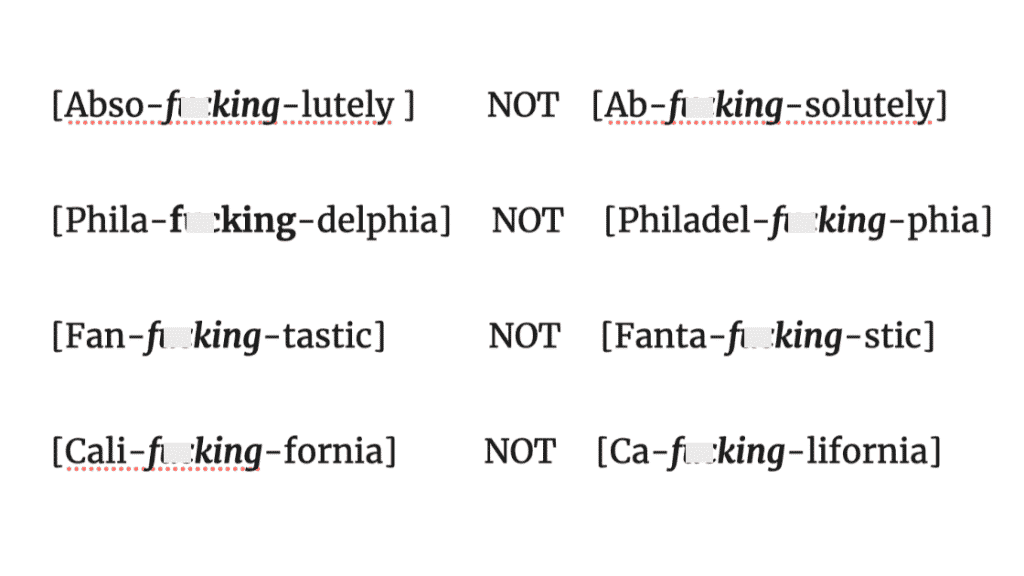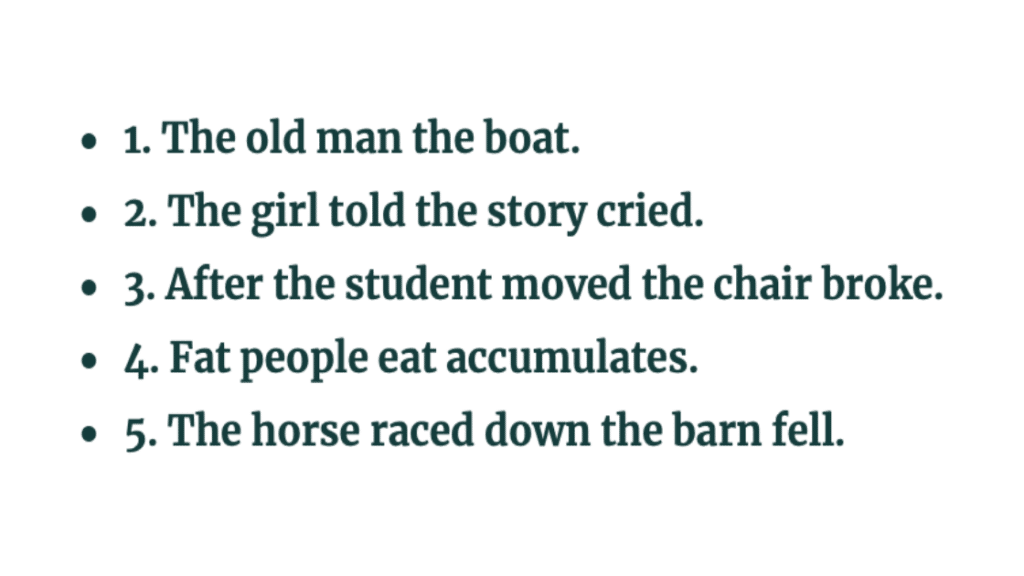It fascinates me how much we know about our languages and that we don’t know we know. Nobody taught us anything as babies and yet we could navigate, quite easily and effortlessly, our way inside the linguistic maze we were thrown into. The amount of rules you should know to speak a certain language is breathtaking. Linguists have not yet put a count on these rules; not one single natural language has been completely formalized at all levels of description in any way. And we’re always amazed to find some of these rules and how native speakers abide by them without them knowing it.
One of these precise and fine-tuned rules is one called expletive infixation. How often do you hear people say un-f**king-believable, or abso-bloody-lutely? How about Phila-f**king-delphia? As you can see, this is a process whereby a profane word, such as f**king, bloody, freaking, etc, is shoved into another word for intensification. You’d think at first glance that this is probably random; you just go ahead and insert the word somewhere. Well, no! It turns out that this process is not random and is incredibly rule-governed, systematic, and precise.
Take a look at the following examples:
Fantastic: *fanta-f**king-stick.
Absolutely: *Ab-f**king-solutely
Independent: *Indep-f**king-endent.
Something sounds horribly wrong about the examples above, right? There is a solid good reason why such examples sound so wrong to your ears. They are rejected by our linguistic filters because there is a rule they didn’t obey. Apparently, the expletives have to be inserted in a very precise position within the word. They always go before the primary stressed syllable in a word. Hene the following correct counterparts:
Fan-f**king-tàstic.
Abso-f**king-lùtely.
Inde-f**king-pèndent.
The primary stressed syllables are the ones immediately following the expletives. No English teacher instructed us on how to use this rule, yet we seem to know a great deal about it. In fact, we’re pretty perfect at it. And to tap into this unmistakable ability that each of us has, here are some words. Can you try to insert an expletive into each one of them?
California.
Unrealistic.
Arizona.
Spectacular.
Hippopotamus.
Pennsylvania.
I bet you did just great and you didn’t give it a single thought. Tell us how you did in a comment.








As a video: https://www.youtube.com/watch?v=dt22yWYX64w
I disagree, unreafuckinglistic works better for me (native English speaker of London). It’s awkward being long though, so I wouldn’t say it.
I’m also a native English speaker (of America) and I think any word that uses the prefix “un-” (or similar words where a prefix alters an existing word) would not follow the rule in this article. Consider the following:
un-fucking-believable (not unbe-fucking-lievable)
under-fucking-exposed (not underex-fucking-posed)
semi-fucking-important (not semi-im-fucking-portant)
super-fucking-imposed (not superim-fucking-posed)
So the “rule” is different here where the insertion goes between the prefix and the root word, NOT before the primary stressed syllable.
Except that we’re talking about English, not Latin. This is the equivalent of saying that since the Greek “pter” means wing, we should break down the word “helicopter” as he-li-co-pter. English has different rules for the way syllables are formed, and that includes changing how they worked in the loaner language. It’s for the same reason we don’t pronounce the “p” at the front of pterodactyl–but your desire for prescriptivism would force us to include it.
Thanks, but no.
Disafuckinggree. Unbelievable has two stressed syllables, which is why it goes in either place. Ungoddamnbeshittinglievable that you didn’t catch that.
Who are you and why aren’t you citing any sources?
https://scholarworks.umass.edu/linguist_faculty_pubs/63/
“As you can see, this is a process whereby a profane word, such as f**king, bloody, freaking, etc, is shoved into another word for intensification.”
Profane? How are these words “profane”? https://www.lexico.com/definition/profane There is nothing “sacred” about the various words into which these “profane” words are inserted.
They are vulgar, not profane. https://www.lexico.com/definition/vulgar [see #2]
This, in an article about language. Really?
Even if you allow that there are two stressed syllables in “unbelievable,” “be” wouldn’t be one of them.
Yes. Thank-you. Sometimes a little linguistic knowledge is worse than no knowledge at all.
I love this post, and you have a fan-f**king-tastic typo: “Hene the following correct counterparts”. I’m an editor. Can’t miss this shit.
I said “f**king spectacular” rather than “specf**kingtacular.” Sounds better to me.
It’s definitely unbe-fucking-lievsble in English, the first thing I noticed was the article itself getting that wrong at the start. May be different in American, I suppose.
lol. best internet thread ever